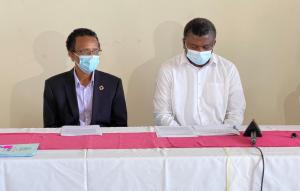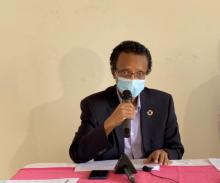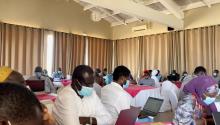The Gambia Reviews the National Health Policy and Strategic Plan (2021-2030)
On the 27th April, 2021 Ministry of Health (MOH) in collaboration with World Health Organization (WHO), held a meeting to review the first draft of the National Health Policy (NHP) and Strategic Plan (NSP) for 2021-2030 at Sunset Beach Hotel. Fifty members of the Extended Senior Health Management (SMT) team, from national and regional directorates attended the review meeting. The meeting was presided by Hon Minister of Health, Dr Ahmadou Lamin Samateh and World Health Organization Representative, Dr Desta Tiruneh.
|
“The national health policies and strategies play an essential role in defining the country’s vision, policy directions and strategies for ensuring the health of its population is up to standard.” Hon. Dr Samateh, Minister of Health |
Minister of Health, Honourable Dr. Lamin Samateh explained the importance of these strategic documents to guide the future of health care and system in The Gambia. “Let me hasten to say that the performance of the health sector shall be guided by the two documents and the unfettered implementation of the policy frameworks require close collaboration, ownership and commitment by all and sundry,” said Dr Lamin Samateh. “The national health policies and strategies play an essential role in defining the country’s vision, policy directions and strategies for ensuring the health of its population is up to standard,” added Dr Lamin Samateh.
WHO’s Representative, Dr. Desta Tiruneh urged members of SMT to ensure the National Health Policies, Strategies and Plans are evidence based, and stakeholders are well engaged in every step. He also emphasized that the process is as important as the content of these important documents.
Dr. Desta Tiruneh said, “The National Health Policies, Strategies and Plans (NHPSPs) offer very clear direction to all health stakeholders to better align their programmes and support with national priorities for measurable and sustained impact. A well thought out health policy and plan allow a country to focus its limited resources on priority health needs and achieve better health outcomes.”
The SMT reviewed the final draft of New Health Policy (NHP) and provided guidance on the development of the new National Strategic Plan for 2021-2030. The NSP will be aligned with the National Development Plan which seeks to see The Gambia being a middle-income economy with a healthy population. The NHP will be anchored on WHO’s framework of six building blocks of health of systems. The Gambia is yet to meet the Abuja Declaration of 27 April 2001 in allocating 15% of the national budget for the health sector.
|
“A well thought out health policy and plan allow a country to focus its limited resources on priority health needs and achieve better health outcomes.” Dr Tiruneh, WHO Representative |
The World Health Organization (WHO) trained a core writing group in the policy formulation to guide the policy and strategic plan development process. A roadmap for the policy development was produced and the WHO provided technical guidance during the process. The development of the policy started with a nation-wide stakeholders’ consultations to come up with a zero draft and priority interventions. A five-day retreat was held subsequently to review the zero draft; and SMT comments were incorporated to produce a first draft of the National Health Policy.
WHO has been providing technical guidance and advice starting from the inception of the NHPSP development in 2020, while the World Bank provided financial resources. UN agencies and other in country health stakeholders such as are National Nutrition Agency (NaNA) and line ministries took part at various stages of the development process.
The Gambia expects to produce a final copy of the National Health Policy and Strategic Plan for use by government and all partners by end of May 2021. The NHP for 2021-2030 will be implemented in two phases from 2021-2025 and from 2026-2030. A mid progress evaluation will be done in 2025 to inform 2nd phase of the implementation.






